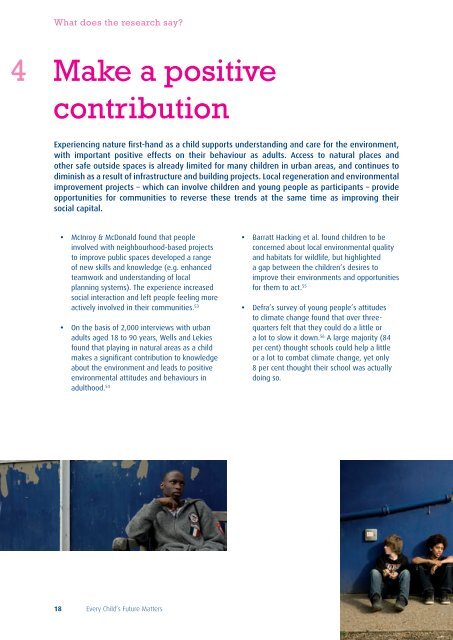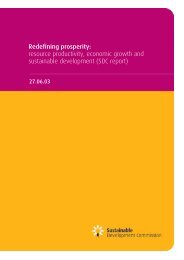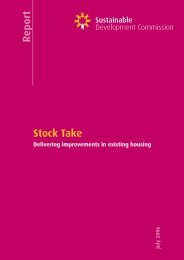Every Child's Future Matters - Sustainable Development Commission
Every Child's Future Matters - Sustainable Development Commission
Every Child's Future Matters - Sustainable Development Commission
You also want an ePaper? Increase the reach of your titles
YUMPU automatically turns print PDFs into web optimized ePapers that Google loves.
What does the research say?<br />
4 Make a positive<br />
contribution<br />
Experiencing nature first-hand as a child supports understanding and care for the environment,<br />
with important positive effects on their behaviour as adults. Access to natural places and<br />
other safe outside spaces is already limited for many children in urban areas, and continues to<br />
diminish as a result of infrastructure and building projects. Local regeneration and environmental<br />
improvement projects – which can involve children and young people as participants – provide<br />
opportunities for communities to reverse these trends at the same time as improving their<br />
social capital.<br />
• McInroy & McDonald found that people<br />
involved with neighbourhood-based projects<br />
to improve public spaces developed a range<br />
of new skills and knowledge (e.g. enhanced<br />
teamwork and understanding of local<br />
planning systems). The experience increased<br />
social interaction and left people feeling more<br />
actively involved in their communities. 53<br />
• On the basis of 2,000 interviews with urban<br />
adults aged 18 to 90 years, Wells and Lekies<br />
found that playing in natural areas as a child<br />
makes a significant contribution to knowledge<br />
about the environment and leads to positive<br />
environmental attitudes and behaviours in<br />
adulthood. 54<br />
• Barratt Hacking et al. found children to be<br />
concerned about local environmental quality<br />
and habitats for wildlife, but highlighted<br />
a gap between the children’s desires to<br />
improve their environments and opportunities<br />
for them to act. 55<br />
• Defra’s survey of young people’s attitudes<br />
to climate change found that over threequarters<br />
felt that they could do a little or<br />
a lot to slow it down. 56 A large majority (84<br />
per cent) thought schools could help a little<br />
or a lot to combat climate change, yet only<br />
8 per cent thought their school was actually<br />
doing so.<br />
18 <strong>Every</strong> Child’s <strong>Future</strong> <strong>Matters</strong>








